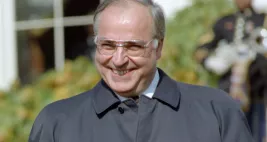Declassified in part in 2006, this US record of a telephone conversation between Helmut Kohl and George H.W. Bush is almost entirely redacted.
August 19, 1991
The Chancellor's [Helmut Kohl's] Telephone Conversation with President George Bush, Monday, 19 August 1991, 13:40 until 13:50 hours
Abteilungsleiter 2 i.V. Bonn, den 19. August 1991
MDg Dr. Kaestner
V e r m e r k
Betr.: Telefongespräch des Herrn Bundeskanzlers mit Präsident George Bush am Montag, 19. August 1991, 13.40 bis 13.50 Uhr[1]
Der Bundeskanzler begrüßt Präsident Bush. Er habe seinen Urlaub unterbrochen, denn die jüngsten Ereignisse in der Sowjetunion seien von gewaltiger Wirkung. Er hoffe, daß die Machthaber in Moskau wenigstens so viel Vernunft besäßen, daß sie begriffen, daß ein Rückfall in alte Verhältnisse sie nicht weiterbringen werde. Niemand werde ihnen helfen. Ohne Hilfe würden sie nichts erreichen.
Präsident Bush pflichtet bei. Er werde in wenigen Minuten eine Pressekonferenz haben und dort erwähnen, daß er mit dem Bundeskanzler in Verbindung gestanden habe.
Die USA - so der Präsident weiter - würden sich von ihrer Verpflichtung, die demokratischen Veränderungen zu unterstützen, sowie vom moralischen Kredit für Michail Gorbatschow nicht zurückziehen. Die entstandene Situation in der Sowjetunion müsse entsprechend der Verfassung gelöst werden.
Der Bundeskanzler betont, es sei jetzt von entscheidender Bedeutung, daß alle westlichen Partner die gleichen Forderungen erhöben:
1. Man gehe davon aus, daß die Sowjetunion alle internationalen Verträge und Vereinbarungen strikt einhält.
2. Man setze darauf, daß die Politik der Abrüstung und Rüstungskontrolle fortgesetzt wird.
3. Die Sowjetunion müsse wissen, daß sie weitere westliche Hilfe nur erhalten werde, wenn sie die Menschen- und Bürgerechte achte und die Politik der Demokratisierung fortsetze.
4. Man müssen großen Respekt für die Leistung Michail Gorbatschows ausdrücken - und als Deutscher wolle er hinzufügen, daß wir Gorbatschow für seinen Beitrag zur deutschen Einheit zu großem Dank verpflichtet seien.
5. Man müsse die Erwartung aussprechen, daß Gorbatschow persönlich unversehrt sei.
Präsident Bush betont, er sei voll einverstanden, man liege auf derselben Wellenlänge. Er werde sich in seiner Pressekonferenz entsprechend äußern und das Gespräch mit dem Bundeskanzler erwähnen.
Wenn - so der Präsident weiter - neue Informationen einträfen, wolle man wieder miteinander in Verbindung treten.
Der Bundeskanzler ist einverstanden. Er weist im übrigen darauf hin, daß alles, was die deutsche Frage betreffe, durch inzwischen ratifizierte Vertrage geregelt sei.
Herzliche Verabschiedung.
(Dr. Kaestner)
[1] BArch, B 136/59746, 13-14.
Head of Department 2 i.r. Bonn, 19 August 1991
MDg Dr. Kaestner, 2210
M e m o r a n d u m
Subject: The Chancellor's Telephone Conversation with President George Bush, Monday, 19 August 1991, 13:40 until 13:50 hours[1]
The Chancellor welcomes President Bush. He had interrupted his vacation. Recent events in the Soviet Union had enormous magnitude. His hope was that the current rulers in Moscow had at least as much sanity to acknowledge that a return to the old conditions would not help them. Nobody would assist them. Without help they could not achieve anything.
President Bush endorses this. He would have a press conference in a couple of minutes mentioning that he had been in touch with the Chancellor. The President continues, saying that the USA was not backing away from its commitment to support democratic changes, giving Mikhail Gorbachev moral credit. The new situation in the Soviet Union had to be resolved according to the country’s constitution.
The Chancellor reiterates that it was essential for all Western partners to raise the same demands:
1. One would proceed from the assumption that the Soviet Union strictly respected all its international treaties and commitments.
2. One relied on the continuation of the policy of disarmament and arms control.
3. The Soviet Union had to consider that it could only obtain further Western assistance if it respected human and civil rights and continued the policy of democratization.
4. One had to express one’s respect for the Mikhail Gorbachev’s enormous accomplishments. As a German, he wanted to add that we were indebted very much to Gorbachev for his contributions to Germany’s unity.
5. One had to express the expectation that Gorbachev was safe, personally.
President Bush emphasizes that he fully agreed. They were on the same wavelength. He would comment accordingly in his press conference and would mention his conversation with the Chancellor. If there was new information, they would call each other again.
The Chancellor agrees. Apart from this, he points out that everything related to the German question had been clarified through ratified treaties.
Warm farewell.
(Dr. Kaestner)
[1] BArch, B 136/59746, 13-14.
Kohl and Bush assess the situation in the Soviet Union after the coup. They reiterate their continued support for Gorbachev and his reform policy.
Author(s):
Associated People & Organizations
Associated Places
Associated Topics
Related Documents
Document Information
Source
Original Archive
Rights
The History and Public Policy Program welcomes reuse of Digital Archive materials for research and educational purposes. Some documents may be subject to copyright, which is retained by the rights holders in accordance with US and international copyright laws. When possible, rights holders have been contacted for permission to reproduce their materials.
To enquire about this document's rights status or request permission for commercial use, please contact the History and Public Policy Program at [email protected].
